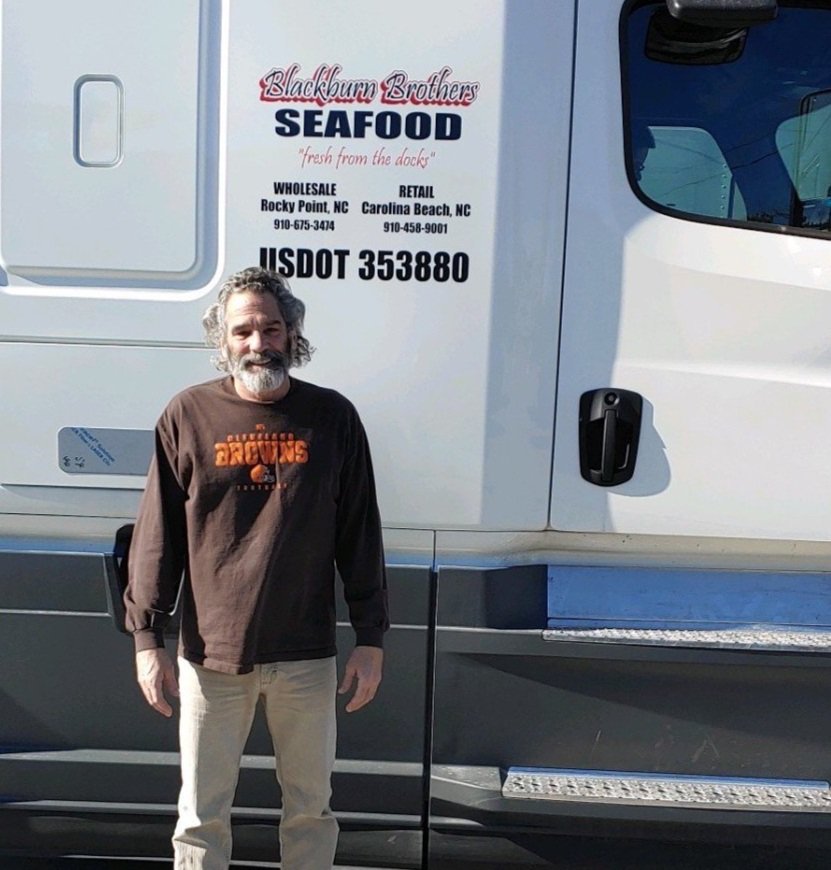Lent is Our Christmas: Bret Blackburn of Blackburn Brothers Seafood Company
Reprinted from Tradewinds Magazine, 2021 by B. Garrity-Blake. Photo courtesy of Bret Blackburn
“My mom, she’s deceased, but she’s popping me on the back of my head because my adjectives get away from me,” said Bret Blackburn of Blackburn Brothers Seafood Company. “Please excuse my language.”
Bret Blackburn is passionate when talking about the fishing industry and the challenges of getting North Carolina seafood on peoples’ plates. Bret, two brothers, and a nephew are equal partners in Blackburn Brothers Seafood Company, a wholesale seafood distribution hub based in Carolina Beach that runs product throughout North Carolina, South Carolina, and Georgia.
“My Dad and Mom loaned us the money forty years ago (1980) to help us get started,” Bret said. “My oldest brother Joe was President. I was a career ECU student – but they made me come home in 1981 because they never found me at the library. I’ve been in the family business ever since.”
Meeting demand for fresh, local seafood is a challenge for Bret and his brothers. Bret gets especially fired up during Lent.
“Lent, for people in the seafood business, is our Christmas,” he explained. “Everyone does seafood during Lent - demand is higher than any other time of the year.”
Lent is the forty-day religious observance from Ash Wednesday to Good Friday right before Easter. Many followers of Lent give up meat as a form of sacrifice -- at least on Fridays -- and instead eat fish. Why Fridays? According to Christian teachings, Jesus Christ died on a Friday. Why fish? Fish are cold-blooded, and it’s the flesh of warm-blooded animals that many consider taboo during Lent.
“Usually when Lent rolls around all I can get of North Carolina product is King Mackerel, croaker, beeliners (vermilian snapper) and triggerfish. That’s four items from local fishermen out of 50 products I handle.”
What’s his biggest obstacle in getting local product? Weather.
Much of the seafood distributed by Blackburn Brothers is governed by the South Atlantic Fisheries Management Council, which has jurisdiction over species in federal waters off the coast of North Carolina, South Carolina, Georgia, and the Atlantic waters of Florida. For winter fisheries managed by quota, this system is stacked in favor of southern states with better fishing weather.
“Typically when beeliners open in the winter, our guys in North Carolina don’t have good weather to fish,” Bret emphasized. “In Florida they’re constantly fishing, while our state can’t get the product.”
In 2020, the South Atlantic Council didn’t close the season and increased the quota to help offset the market hardships presented by Covid-19.
“Here I am packing out in Carolina Beach, wholesale distributor for 40 some years, and this is the first year I can remember when beeliners were not shut down,” Brett said. “Fisheries managers are working with us.”
The pandemic has transformed the seafood business, and Blackburn Brothers is no exception.
“Covid-19 has had a terrible outcome for a lot of Americans,” Brett said. “But business-wise for us it has not been bad.” Blackburn Brothers has a retail store in Carolina Beach as well as a packing house. “Our retail sales have doubled since Covid – people are learning how to cook again.”
But restaurant sales have taken a hit.
“For example, we sell to Mama Dips in Chapel Hill, a black-owned business. But due to the coronavirus and the impact on restaurants, they haven’t ordered from us since November.”
Another challenge in getting local seafood is the growing shortage of local fishermen. According to state license data, North Carolina has about half the number of active commercial fishermen today compared to twenty years ago.
“If the fish show up, the fishermen aren’t there to catch them,” Bret said. “It’s so regulated. A fisherman can’t go home and tell his wife he can’t work tomorrow because too many fish have been caught and the quota’s been met by Florida.”
Blackburn added that commercial fishermen are a rare breed, and for those who hang up their oilskins for a land-based job it can’t be easy.
“It’s hard to be a successful commercial fisherman. Some people commercial fish very good but don’t do other jobs very good. Their niche in society is to not be in society – it’s to be out there on the water.”
How do wholesale distributors like the Blackburn Brothers survive when demand for local seafood outstrips supply?
“You can’t sell just North Carolina product and think you’ll survive because you’ll go out of business,” Brett said. “We have a great local product to sell, but I can’t wait for availability - these truck payments are due every month, I’ve got guys on salaries – I’ve got to pay people. If I can’t get it from North Carolina, I do everything I can to buy off the east coast. If not that, then I use my import connections.”
Blackburn Seafood Company runs ten trucks and nine routes out of their distribution center in Rocky Point. They employ fifty people, Including the folks who work at their Carolina Beach packing house and retail store, most of whom are full time.
The company does what it can to keep the trucks loaded, moving, and delivering a steady supply of product -- no matter where it comes from. In the spring and summer up to fifty percent of their seafood is from North Carolina. In the winter, just twenty percent is local.
“I’m constantly buying product out of Miami, Connecticut, New York, Rhode Island,” Blackburn said. “You have to diversify to survive -- we buy up and down the east coast, we buy imported product. We stay in business with a little bit of luck and the ability to buy product around the world.”
Blackburn Brothers Seafood hedges their bets by including frozen seafood in the mix.
“I’ve got to have a Plan B because of the weather – I have frozen product that I use when I can’t get fresh. On a daily basis, we’re distributing 85 percent fresh, 15 percent frozen. It has to be a product that’s marketable – you can’t sell it as chicken salad and it thaws out as chicken shit, if you know what I mean.”
Brett Blackburn says that his company has survived extreme financial hits and market disruptions like 9/11 and the Coronavirus by capitalizing on the trust they’ve earned over the years.
“Banks only loan you money if you can prove to them you don’t need the money,” Bret maintained. “We’ve survived the ups and downs because of our word and reputation. There’s no contracts in the seafood business. Trust is what the fishing business is.”
Blackburn Brothers’ best customers are Latinos, Asians, and African-Americans.
“Seafood is in their regular diet,” said Bret. “They know their fish. They don’t mind buying the whole fish or split. And now with Covid, everyone’s learning to cook seafood at home instead of going to restaurants.”
Looking back on his career in seafood wholesale distribution, Blackburn summed it up as a “tough ride” with no regrets.
“My mom would say, ‘God ain’t gonna put a mountain in front of you that you can’t climb.’ But I say, dammit, can’t I get a hill?”

